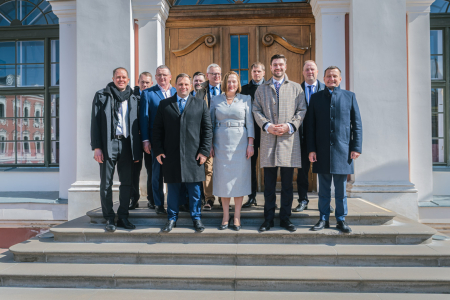Baltic Agriculture Ministers Highly Appreciate LBTU’s Contribution to Food Innovation
On April 11, the agriculture ministers of the Baltic States visited the Latvia University of Life Sciences and Technologies (LBTU) in Jelgava to learn more about the university’s latest scientific achievements, developments in food technologies, and innovations. During the visit, special attention was given to food safety and sustainable technologies developed by LBTU researchers in cooperation with industry partners.
The ministers – Latvia’s Minister of Agriculture Armands Krauze, Lithuania’s Minister of Agriculture Ignas Jankauskas, and Estonia’s Minister of Regional Affairs and Agriculture Hendrik Johannes Terras – were introduced to the work of LBTU’s Technology and Knowledge Transfer Department, the Food Institute, and the EIT Food Hub in Latvia. At the end of the visit, the ministers also toured LBTU’s main building – Jelgava Palace – where further cooperation opportunities in education and science were discussed.
LBTU is a partner of the EIT Food Knowledge and Innovation Community of the European Institute of Innovation and Technology (EIT), which promotes the development of food innovations and sustainable technologies. This initiative brings together universities, research institutes, and companies to create new solutions within the food system. LBTU’s Technology and Knowledge Transfer Department is one of the leading centers for knowledge and innovation development in Latvia, facilitating the creation and implementation of new technologies in the bioeconomy sector.
During the visit, the ministers also had the opportunity to taste freeze-dried food products developed by LBTU scientists in close cooperation with the company AS "Roga Agro." Freeze-drying, or lyophilization, is a high value-added food processing method that significantly reduces the water content of products while preserving up to 97% of their nutrients. One of the key advantages of this technology is long-term storage without compromising nutritional value or sensory qualities. As a result of the collaboration, innovative freeze-dried meal recipes have been developed and thoroughly tested. These products are particularly well-suited for the military sector, providing safe and nutrient-rich food reserves for soldiers, and can also be used in extreme conditions and crisis situations.
Minister of Agriculture Armands Krauze emphasized: "Today we witnessed how strategically important science is for our sectors. By investing in science and innovation, we can create high value-added products that not only strengthen the competitiveness of our industries and universities but also offer sustainable solutions to pressing societal needs. The work done at LBTU proves that we are capable of ensuring national food security and producing niche products needed not only by our military but also applicable in tourism and other life contexts."
LBTU Rector Irina Arhipova highlighted the university’s role in innovation development: "We highly value the opportunity to give the agriculture ministers of the Baltic States deeper insight into our university’s research directions and latest scientific achievements. Only through close cooperation with the industry can we ensure that the knowledge and innovations developed in Jelgava are meaningfully transferred into solutions important to society. The ministers’ visit confirms that the development of education, science, and innovation in agriculture and food sectors is a strategically important matter."
